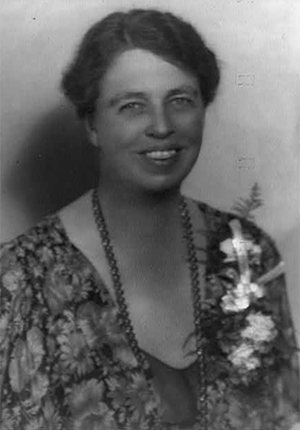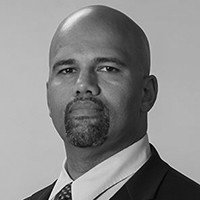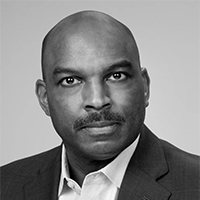Historic Document
The Struggle for Human Rights (1948)
Eleanor Roosevelt | 1948

Library of Congress, Prints and Photographs Division
Summary
Eleanor Roosevelt (1884-1962) redefined the position of First Lady during the presidency of her husband, Franklin Roosevelt, becoming well-known for her attention to social reform issues. After the founding of the United Nations, President Harry Truman asked Eleanor Roosevelt to serve as a delegate to its General Assembly, and she was chosen to chair the commission that drafted the Universal Declaration of Human Rights. Here, Roosevelt speaks in support of the Declaration, connecting human rights to America’s constitutional tradition – in particular the Bill of Rights encompassed in the first ten Amendments to the U.S. Constitution. She distinguished that tradition from that of the Soviet Union, which objected to the final document. The General Assembly voted to adopt the Universal Declaration of Human Rights on December 10, 1948.
Selected by

Christopher Brooks
Professor of History, East Stroudsburg University

Kenneth Mack
Lawrence D. Biele Professor of Law, Harvard Law School
Document Excerpt
I have come this evening to talk with you on one of the greatest issues of our time—that is the preservation of human freedom. . . .
. . . Concern for the preservation and promotion of human rights and fundamental freedoms stands at the heart of the United Nations. . . . In the preamble to the Charter the keynote is set when it declares: ‘We the people of the United Nations determined...to reaffirm faith in fundamental human rights, in the dignity and worth of the human person, in the equal rights of men and women and of nations large and small, and . . . to promote social progress and better standards of life in larger freedom.’ This reflects the basic premise of the Charter that the peace and security of mankind are dependent on mutual respect for the rights and freedoms of all.
One of the purposes of the United Nations is declared in article 1 to be: ‘to achieve international cooperation in solving international problems of an economic, social, cultural, or humanitarian character, and in promoting and encouraging respect for human rights and for fundamental freedoms for all without distinction as to race, sex, language, or religion.’ . . .
The [Universal Declaration of Human Rights] has come from the Human Rights Commission with unanimous acceptance except for four abstentions—the U.S.S.R., Yugoslavia, Ukraine, and Byelorussia. . . .
We must not be confused about what freedom is. Basic human rights are simple and easily understood: freedom of speech and a free press; freedom of religion and worship; freedom of assembly and the right of petition; the right of men to be secure in their homes and free from unreasonable search and seizure and from arbitrary arrest and punishment. . . .
What are the differences, for instance, between trade-unions in the totalitarian states and in the democracies? In the totalitarian state a trade-union is an instrument used by the government to enforce duties, not to assert rights. . . .
Our trade-unions, on the other hand, are solely the instruments of the workers themselves. They represent the workers in their relations with the government and with management and they are free to develop their own opinions without government help or interference. . . .
I think the best example one can give of this basic difference of the use of terms is “the right to work” . . . . [T]he right to work in the Soviet Union means the assignment of workers to do whatever task is given to them . . . . We in the United States have come to realize it means freedom to choose one’s job, to work or not to work as one desires. We, in the United States, have come to realize, however, that people have a right to demand that their government will not allow them to starve because as individuals that cannot find work of the kind they are accustomed to doing. . . .
The final expression of the opinion of the people with us is through free and honest elections, with valid choices on basic issues and candidates. The secret ballot is an essential to free elections. . . .
Our trade-unions grow stronger because the people come to believe that this is the proper way to guarantee the rights of the workers and that the right to organize and to bargain collectively keeps the balance between the actual producer and the investor of money and the manager in industry who watches over the man who works with his hands and who produces the materials which are our tangible wealth.
In the United States we are old enough not to claim perfection. We recognize that we have some problems of discrimination but we find steady progress being made in the solution of these problems. . . Our Supreme Court has recently rendered decisions to clarify a number of our laws to guarantee the rights of all. . . ,
The future must see the broadening of human rights throughout the world. People who have glimpsed freedom will never be content until they have secured it for themselves. In a true sense, human rights are a fundamental object of law and government in a just society. Human rights exist to the degree that they are respected by people in relations with each other and by governments in relations with their citizens.




